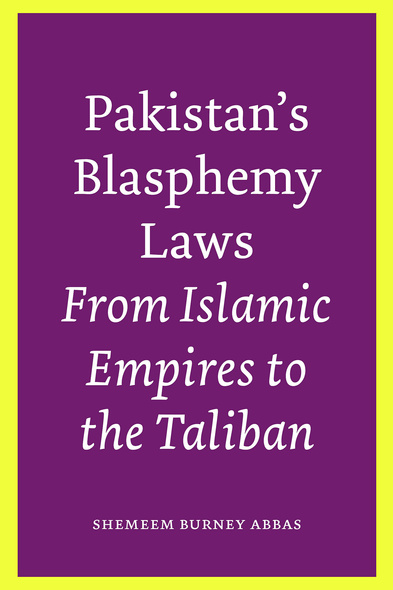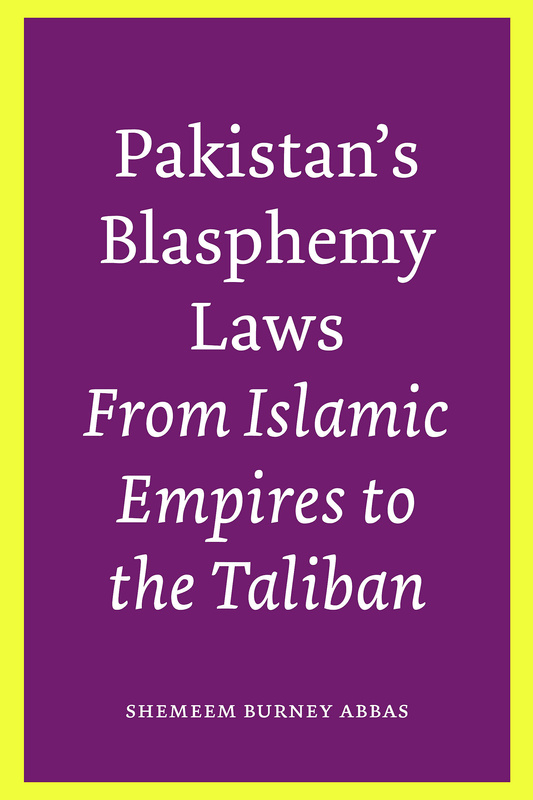Pakistan’s Blasphemy Laws
From Islamic Empires to the Taliban
Under the guise of Islamic law, the prophet Muhammad’s Islam, and the Qur’an, states such as Pakistan, Afghanistan, Egypt, Saudi Arabia, and Bangladesh are using blasphemy laws to suppress freedom of speech. Yet the Prophet never tried or executed anyone for blasphemy, nor does the Qur’an authorize the practice. Asserting that blasphemy laws are neither Islamic nor Qur‘anic, Shemeem Burney Abbas traces the evolution of these laws from the Islamic empires that followed the death of the Prophet Muhammad to the present-day Taliban. Her pathfinding study on the shari’a and gender demonstrates that Pakistan’s blasphemy laws are the inventions of a military state that manipulates discourse in the name of Islam to exclude minorities, women, free thinkers, and even children from the rights of citizenship.
Abbas herself was persecuted under Pakistan’s blasphemy laws, so she writes from both personal experience and years of scholarly study. Her analysis exposes the questionable motives behind Pakistan’s blasphemy laws, which were resurrected during General Zia-ul-Haq’s regime of 1977–1988—motives that encompassed gaining geopolitical control of the region, including Afghanistan, in order to weaken the Soviet Union. Abbas argues that these laws created a state-sponsored “infidel” ideology that now affects global security as militant groups such as the Taliban justify violence against all “infidels” who do not subscribe to their interpretation of Islam. She builds a strong case for the suspension of Pakistan’s blasphemy laws and for a return to the Prophet’s peaceful vision of social justice.
Shemeem Abbas has written a courageous and important book, the first of its kind on blasphemy laws of Pakistan. It is an important contribution to the history of Pakistan and of Islam, and urgent reading in today’s troubled times. While a scholarly monograph, the book is written in an engaging, easy-to-read style, and especially because of its use of visual materials such as posters, charts, and maps, is an excellent introductory book for lay readers as well as students of Islam and Pakistan, and for scholars of the field of Islamic Studies as well.
Focusing largely upon Pakistan, this book vividly illustrates the growing frenzy within some contemporary Muslim societies to exterminate those perceived as religious deviants. The author’s personal experiences, as well as the open support recently extended by Pakistan’s legal community to those who kill alleged blasphemers, are part of a disturbing global trend. That this slide into medieval barbarism can happen in the twenty-first century makes one fear for the future of the human species.
Professor Abbas’s own fatwah provoked her to inquire into the origin of Pakistan’s ‘blasphemy laws.’ General Haq and his mullahs updated models invented by the Abbasids, the Omayyads and the rest of the Islamic theocracies. Her surprising conclusion: ‘blasphemy laws’ were derived not from the Qur’an but from Islamic polities. Literate illiterates still twist Surah 53:11 to enforce their zeal for civic unity.
Shemeem Burney Abbas is the Doris and Carl Kempner Distinguished Professor of Political Science, Gender Studies, and Literature at the State University of New York at Purchase. She was formerly a professor and chair of the Department of English Language and Applied Linguistics at Allama Iqbal Open University in Islamabad, Pakistan.
- Preface. The Ethnography of a Military State
- Chapter 1. Pakistan’s Military State and Civil Society
- Chapter 2. Muhammad, the Messenger
- Chapter 3. Blasphemy Laws’ Evolution
- Chapter 4. Colonial Origins, Ambiguities, and Execution of the Blasphemy Laws
- Chapter 5. Risky Knowledge, Perilous Times: History’s Martyr Mansur Hallaj
- Chapter 6. Blasphemy Cultures and Islamic Empires
- Conclusion. The Affiliates: Where To?
- Appendices
- 1. Fieldwork
- 2. Text of Pakistan’s Blasphemy Laws
- 3. A Statement by the Asian Human Rights Commission
- 4. The Hudood Ordinance Qanun-e Shahadat, the Law of Evidence
- 5. Fate of a Teacher Accused of Blasphemy to Be Decided Today
- Notes
- Bibliography
- Index





